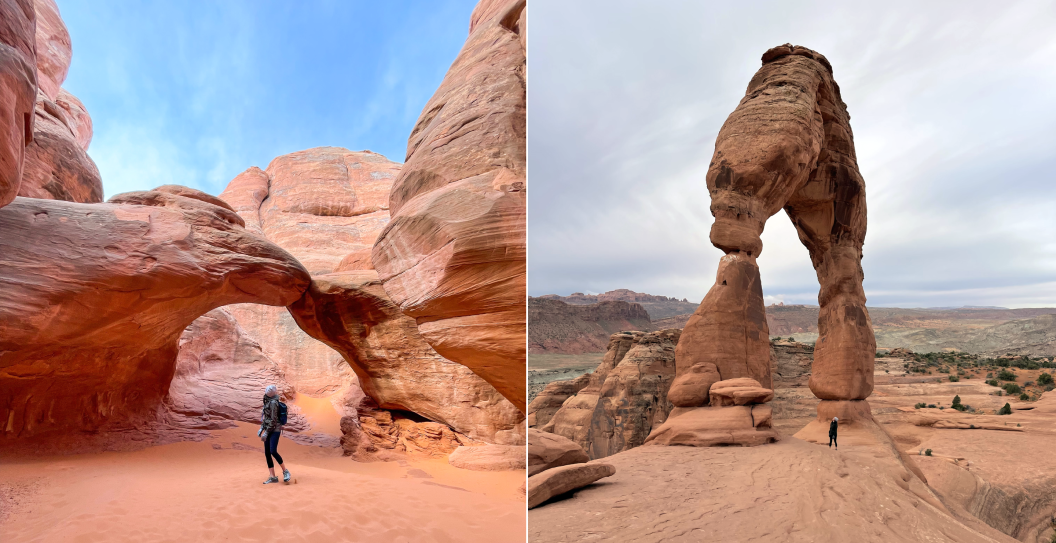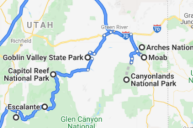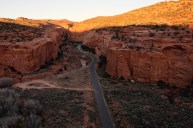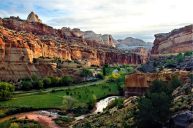Southeast Utah's Arches National Park is one of my favorite national parks on Earth. And coming from me, that's saying something: I've explored 19 U.S. national parks (and counting) on my quest to visit all 63 in America.
Located just north of Moab, Utah, Arches is spread over 76,000 acres and has more than 2,000 natural stone arches, balancing rocks, and spire-like pinnacles. The Delicate Arch is the most famous attraction, and people come from all over the world to see it.
Arches National Park has many amazing trails where you can explore and see incredible views, hidden canyons, natural bridges, and even ancient petroglyphs. It's like stepping into a surreal world shaped by millions of years of nature just doing its thing. Another reason Arches is a must-do trip: It's close by places such as Grand Staircase-Escalante National Monument and, therefore, the perfect stop on a bigger Utah road trip.
If you're planning a visit, this guide to Arches National Park will help you make the most of your trip and have an unforgettable adventure!
Where Is Arches National Park?
Arches National Park is in southeastern Utah, adjacent to the Colorado River. The nearest town is Moab, which is about 5 miles away from the park's entrance. To reach Arches, you can drive into Moab via U.S. Highway 191 North. The park has a well-marked visitor center near the entrance where you can obtain maps and other information.
If you prefer flying instead of a road trip, the nearest major airport is Salt Lake City International Airport (SLC), about 230 miles north. From the airport, you can rent a car and drive to Arches National Park using Interstate 15 and U.S. Highway 191. Smaller regional airports in Grand Junction, Colorado (GJT), and Moab, Utah (CNY), are closer and offer limited flight options.
How Was Arches National Park Formed?
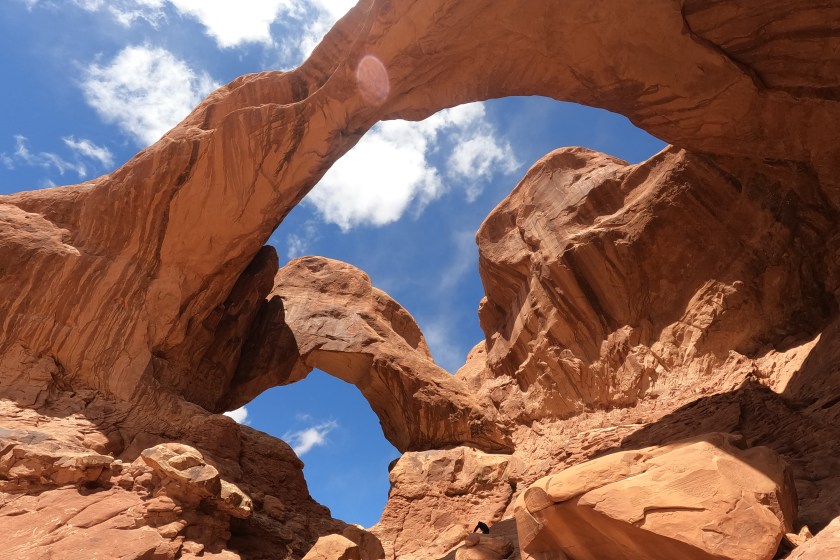
Kendra Tustin for Wide Open Spaces
Arches National Park was formed through a combination of geological processes that unfolded over millions of years. It all began with sandstone, deposited during ancient seas and later covered by other sedimentary layers. Over time, tectonic forces including uplifting and faulting started shaping the landscape. Erosion played a crucial role, as wind and water gradually wore away the softer rock layers, revealing the harder sandstone beneath.
This ongoing erosion sculpted the iconic arches, spires, bluffs, and other unique rock formations seen in the park today. The delicate balance between the forces of erosion and the resilience of the natural sandstone arches continues to shape and evolve the park's landscape.
Originally established as Arches National Monument in 1929 and encompassing just two of its current sections (Devil's Garden and The Windows), the entire area earned National Park status in 1971.
When Is the Best Time to Visit?
Being located in a high desert, the best time to visit Arches National Park is in the spring from March to May or fall in September and October. During these periods, the weather is generally mild, with pleasant temperatures during the day and cooler nights. The park can be crowded during these times, especially in April and October, but the stunning landscapes make the visit worth it.
June to August brings scorching heat, with temperatures often exceeding 100°F. However, if you can handle the heat and plan your activities for early morning or late afternoon when it's cooler, you can still enjoy the park. Just ensure you have plenty of water and sun protection.
Visiting this national park during winter (December to February) can be cold, and snowstorms are not uncommon. The park's red rocks against a snowy backdrop offer a unique and beautiful sight, but some trails may be icy and inaccessible during that time.
The weather can also change quickly, so whenever you go, bring layers. I visited Arches in April 2022. The morning we drove into the park, it was freezing and with snow flurries. Once we got into the park, the snow cleared. Then another 45 minutes later, the clouds cleared and the skies were blue. Also, it was freezing! The low was 20°F with a wind chill. We were like human popsicles.
Ultimately, the choice of when to visit depends on your preferences and tolerance for crowds or extreme weather.
What to Do in Arches National Park
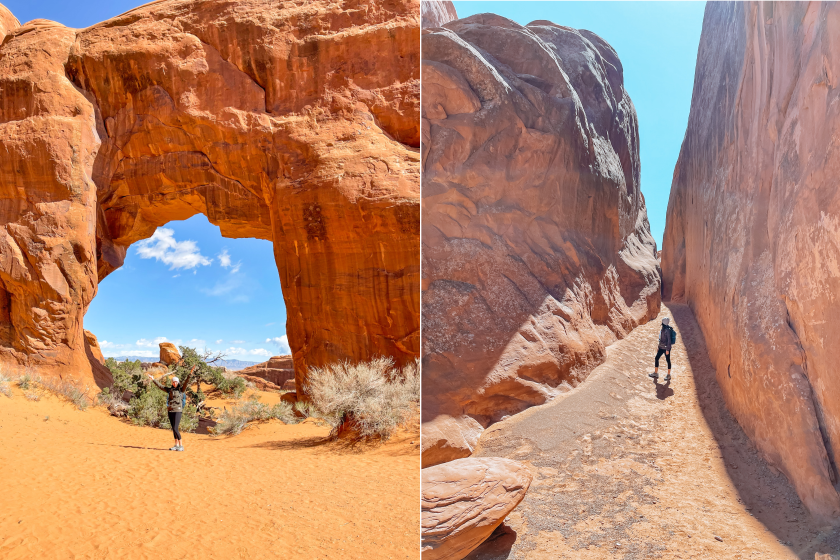
Kendra Tustin for Wide Open Spaces
In Arches National Park, you can view over 2,000 natural stone arches, hike to iconic landmarks such as Delicate Arch and Landscape Arch, take scenic drives along the park's roads, explore hidden canyons, and witness stunning sunrises and sunsets.
This is, by far, the most popular hike at Arches National Park. There have been a lot of opinions about whether it's worth. In my humble opinion, this is a bucket-list hike that I believe everyone should experience. Yes, it gets busy. Yes, the parking lot fills up quickly. However, you can optimize your time on this hike and beat the crowds. When I went to Arches National Park, I knew this was the first hike I had to do. I booked my time reservation two months in advance and booked for the time slot entry for 7 a.m. on a weekday. I got in the park right on time and went straight to the Delicate Arch parking lot, which by 7:15 had a decent number of cars but was nowhere near filled. On the hike, I saw maybe 10 people. When I got to the arch, there were six other hikers sitting around. Everyone was quiet, taking pictures and enjoying the view. My fiancé and I were able to get so many photos and videos without waiting in line or trying to get people out of the shot. The cavalry showed up around 8:30 to 8:45. Essentially, you can experience Delicate Arch without the crowds—if you time your visit right. The Landscape Arch, the longest natural stone arch in the world, measures around 290 feet wide. A large part of it broke off years back, so I recommend trying to see this arch as soon as possible. Who knows when it might fall? It can be found on the Devil's Garden Hike, another popular hike because of the many other arches along the trail. If you have a half-day or so, exploring the Devil's Garden Trail is a worthy use of your time. The variety of trail options available allows for flexibility in the hike's length and duration. Some of the arches seen on this trail include Landscape Arch, Navajo Arch, Partition Arch, and Tunnel Arch. This is a great option if you're not looking for a crazy type of hike. Double Arch is just a hop, skip, and jump from the parking lot! That said, the parking lot will get full, so best to get there early. Double Arch is unique because you can actually climb underneath it. If you don't feel like walking up to it, no problem: You can get a great view right from the parking lot. Adjacent to the Double Arch is the well-known The Windows Section, which has a slew of interesting rock formations in just 2 square miles. The only way to hike this is via a guided tour for $16 per person, which you can book up to seven days in advance. Due to the nature of this hike, no children under the age of 5 are allowed—it's very challenging with all types of terrain, like a maze through rough and uneven sandstone and narrow slot canyons. It's a trip!Hiking
Arches National Park offers diverse hiking opportunities amid its stunning desert landscapes. From easy strolls to challenging treks, hikers can explore trails leading to iconic arches, expansive vistas, sandstone formations, and hidden canyons. These hikes provide a range of experiences suitable for all skill levels and interests.My Top Recommendations
Scenic Views and Drives
If you're not up for hiking, no problem. The park has amazing areas that don't require any hiking at all. Some of these spots are a short walk from the parking area. If you want to cruise around the park and take in the sights, no problem there as well. Pro tip: Biking is only permitted on established roads, so keep that in mind if you want to see Arches under your own pedal power.My Top Recommendations
This is the main road that runs through the park, offering access to many of the park's major attractions. The drive is approximately 18 miles long and takes you past numerous viewpoints, and you can see Delicate Arch and Landscape Arch without hiking to them.
Located off the main park road, this short scenic drive takes you to the Windows Section, where you can view impressive arches such as the North Window, South Window, and Turret Arch. The drive is approximately 2 miles round-trip.
This spot was one of my favorites while visiting Arches National Park. The red rock walls shoot up into the sky like buildings in New York City. Fun fact: The intro to "Raiders of the Lost Ark" was filmed in front of Park Avenue! If you want to take in the views of Park Avenue, there's an accessible walkway that gives you an amazing panoramic look at the red rocks. To get more up close and personal, you can hike the trail right beneath the viewing platform. Fair warning: It's pretty steep and about 2 miles round-trip.
This spot gives you a 360-degree view of the La Sal Mountains as well as other formations such as Three Gossips, Sheep Rock, and The Organ in the Courthouse Towers Area.
I call this viewpoint a roadside attraction, as it's easily accessible and a great place for a photo op. It's literally right off the main road—you cannot miss it. This famed geological formation consists of a large boulder perched on top of a narrow pedestal of softer rock. It boggles the mind!
Other Things to Do at Arches
Arches National Park has one visitor center, located near the park entrance, that is the main information hub. Its knowledgeable staff can provide you with maps, brochures, and trail information, and answer any questions you may have about the park. Plus, you can grab a souvenir for the road. My go-to is stickers. I'm always grabbing stickers when I visit national parks!
- Stargazing: Due to its remote location and limited light pollution, Arches National Park is an excellent place for stargazing. On clear nights, you can witness a breathtaking display of stars and constellations. The park occasionally hosts stargazing festivals or events, which provide educational and informative experiences under the night sky.
- Ranger programs: The National Park Service offers ranger-led programs and activities that provide insights into the park's natural and cultural history. These programs may include guided walks, talks, and interactive demonstrations. Check with the park's visitor center for a schedule of ranger-led activities during your visit.
- Rock climbing: Arches National Park is a popular destination for rock climbers. If you have the necessary skills and equipment, you can climb designated routes within the park. However, it's important to obtain the required permits before you start climbing.
What Should You Wear to Visit Arches National Park?
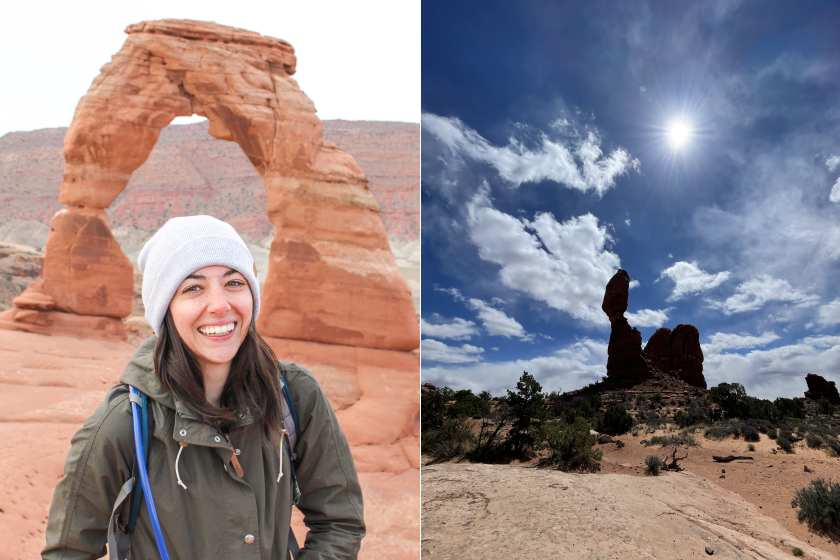
Kendra Tustin for Wide Open Spaces
What clothing to wear at Arches depends largely on the time of year. From May to September, it will be very, very sunny and sweaty, and you'll want hot-weather hiking gear. If you visit in shoulder season or winter, the wind can be chilly, so you'll likely want more layers. Regardless, make sure you're wearing solid sun protection for your skin.
As with any visit to the great outdoors, you want to be prepared for your visit to Arches. Here's what I recommend packing:
- Comfortable clothing: Dress in layers. The temperature can vary throughout the day.
- Sturdy footwear: Opt for comfortable, closed-toe shoes or hiking boots with good traction.
- Water: Bring ample water to ensure you stay hydrated, especially when you're going on a long hike and the sun is extreme.
- Snacks and meals: Pack plenty of food, especially if you plan to spend an entire day exploring.
- Trail map or guidebook: Get a park map from the visitor center to navigate the roads, trails, and attractions within the park.
- First aid kit: It's always smart to carry a basic kit with bandages, tape, and antiseptic wipes. I got a nasty blister when I was here, so I always have bandages handy for that exact situation.
- Insect repellent: You definitely need this to protect yourself from mosquitoes!
- Sunscreen, hat, and sunglasses: They're a no-brainer if you're visiting a desert location with minimal shade. Bring chapstick as well in case there's a wind chill.
Where to Stay Near Arches National Park
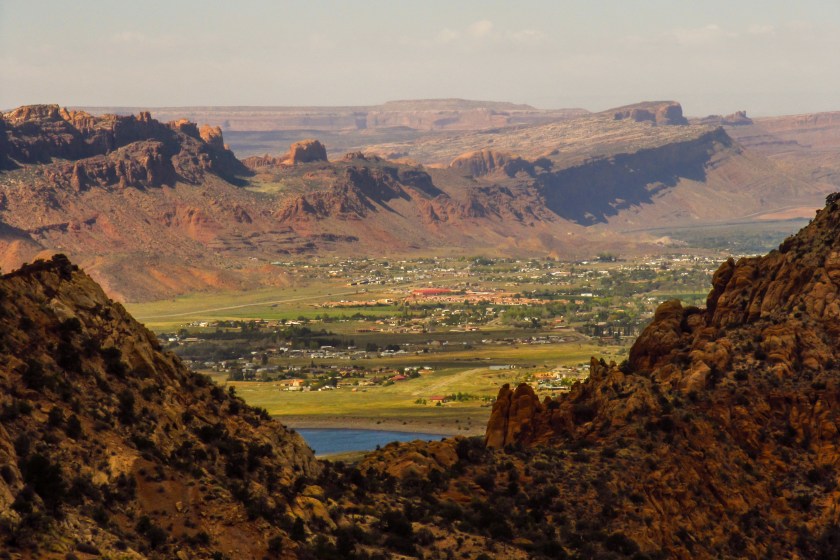
Getty Images, Marieke Peche
When visiting Arches National Park, you can take advantage of several lodging and accommodation options available in nearby Moab.
The cute town of Moab offers a range of hotels and motels catering to different budgets and preferences. Some well-known options include Best Western Plus, Canyonlands Inn, Hampton Inn Moab, and Red Cliffs Lodge. I stayed at the Hampton Inn during my stay, and it was great! Arches National Park has a campground called Devil's Garden Campground that offers tent and RV camping. Though it's technically first come, first served, reservations at Devil's Garden are recommended during the busy season. Backpacking is permitted at Arches in limited backcountry areas but requires a permit. Additionally, there are numerous private campgrounds in the Moab area. Moab has a variety of vacation rental options, including cabins, condos, and houses. Check out Airbnb and VRBO for these vacation rentals. If you're traveling in an RV, Moab has several RV parks with full hookups and amenities. Examples include Devil's Garden within Arches, Moab Valley RV Resort & Campground, and Portal RV Resort.
What Time Does Arches National Park Open?
Technically, Arches National Park is open 24 hours. However, with national parks gaining popularity, that means more crowds during the day in the peak seasons. The National Park Service has begun integrating reservations systems for several of the most visited parks, including Arches.
Do I Need a Reservation to Visit Arches?
From April 1 to Oct. 31, timed entry reservations are required to enter the park between 7 a.m. and 4 p.m. This is to help with the congestion of crowds and make visitors' trips more enjoyable. If you don't have a reservation, you can enter the park before 7 a.m. and after 4 p.m.
You can book a reservation at Arches through Recreation.gov for $2. You choose your date, select how many vehicles (and which type) you'll be reserving, and pick an available time slot. The earlier times get booked first, so if you want to make a day of it, try to make your morning reservation at least four to six weeks in advance.
Along with the reservation fee, you need to pay the entrance fee, which is dependent on how you arrive: $15 for walking in, $25 for motorcycles, and $30 for cars. Arches is also included in the $80 annual America the Beautiful pass, or you could combine entry fees with Canyonlands National Park for $50. And don't forget: There are several days throughout the year when you can visit national parks for free. Make sure to double-check NPS.gov for the most up-to-date information.
Are Dogs Allowed at Arches National Park?
Technically, yes, but with limitations. Pet-friendly activities are extremely limited at the park. You can have your dog in the campgrounds and at pull-outs along the paved scenic drives. You can walk your dog on roads or in parking lots, but they must be leashed at all times when outside a vehicle. That said, you can't hike with your dog at Arches, and you can't leave them unattended, except in a paid-for campsite in the Devil's Garden Campground.
Is It Worth Visiting Arches National Park?
Without a shadow of a doubt, yes—100%! The red rocks are so captivating. The incredible number of arches in this park is mind-boggling! When I was walking along the Devil's Garden Trail, I was yelling at my fiancé, "You get an arch! You get an arch! You get an arch!"—channeling Oprah as I obnoxiously pointed at all the formations we passed.
This is a haven for a bucket-list traveler. Whenever you have the opportunity to visit Arches National Park, just go for it. I promise you will not regret it.
READ MORE: I've Been to 18 National Parks—These Are the Worst Mistakes I See Visitors Make Over and Over
